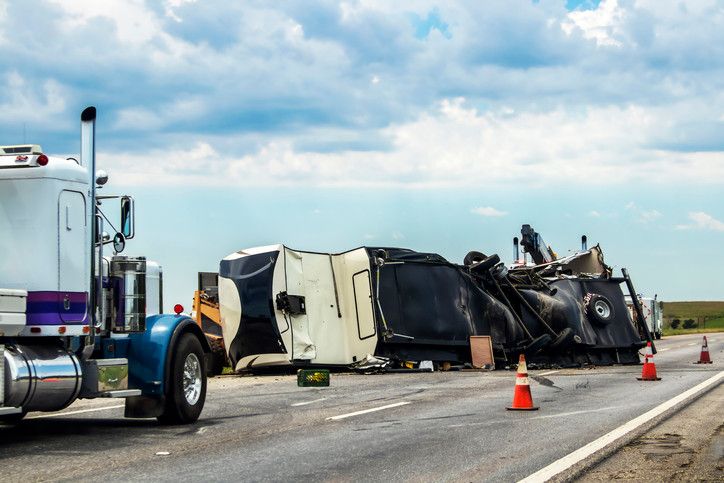Table of Contents
Our Georgia truck accident attorneys know commercial vehicle collisions and car crashes differ in several ways, primarily due to the nature of the vehicles involved, the regulations governing commercial vehicles, and the potential consequences of such incidents.
Here, our Gwinnett County personal injury lawyers explain some of those differences.
The Weights and Sizes of the Vehicles Commercial vehicles, like trucks, buses, and delivery vans, are significantly larger and heavier than passenger cars. This size and weight disparity can result in more severe damage and injuries in commercial vehicle collisions than in passenger vehicle crashes.
The Regulations and Licensing Requirements
Commercial vehicles are subject to various Federal Motor Carrier Safety Administration (FMCSA) and state regulations that govern their operation, maintenance, and safety. This includes requirements for driver licensing, hours of service, safety inspections, and vehicle maintenance. Passenger car drivers do not face the same regulations, training, and experience the FMCSA requires. However, the FMCSA applies to all commercial vehicles, which are defined as any vehicle used on the highway in interstate commerce transporting people or property with a gross vehicle rating or gross combination weight rating or gross vehicle weight rating of 10,001 pounds or more. The state of Georgia adopted the Federal Regulations and apply them to both private and for hire companies.
Insurance Coverage Requirements
Commercial vehicles must carry higher insurance coverage — based on the size, type, and cargo they are carrying — due to the potential for more significant damages and injuries in accidents involving these vehicles. Passenger car drivers generally have lower insurance requirements. In Georgia, motor carriers – such as box trucks -(those that are intrastate) are required to carry liability insurance with at least $100,000 per person limits. Federal regulations say that any motor carrier transporting cargo or property (across state lines) must carry insurance with at least $750,000. For large trucks carrying hazardous materials, the liability limit needs to be at least $1 million, and for certain tanker trucks transporting hazardous materials, the coverage increases to at least $5 million. Determining how much insurance coverage a commercial driver has may be complex.
The minimum liability insurance limits required under Georgia law are:
- Bodily Injury Liability: $25,000 per person/$50,000 per incident.
- Property Damage Liability: $25,000 per incident.
Potentially Complex Liability When a Crash Occurs
Commercial vehicle collisions may involve multiple parties, including the vehicle operator, the employer or carrier, and the vehicle manufacturer or maintenance provider. Determining liability in such cases is more complex than in passenger car accidents. In most commercial vehicle accident cases it is necessary to hire an accident reconstruction expert to investigate the accident scene and document the physical evidence by taking photos and videos, including drone video footage. It is also important to request that the commercial vehicle company retain evidence. A letter requesting that they preserve evidence should be sent as soon as possible.
Cargo and Hazardous Materials
Commercial vehicles may carry various types of cargo, including hazardous materials. Accidents involving the release of hazardous materials can have far-reaching environmental and public safety implications, which car accidents typically do not entail. The Potential for Severe Injuries Due to the size and weight of commercial vehicles, collisions with passenger cars can result in more severe injuries and fatalities, which may lead to more extensive legal and medical consequences.
While car accidents and commercial vehicle collisions share some similarities, the differences in vehicle type, regulation, liability, and potential consequences make commercial vehicle collisions more complex in many respects. As a result, the insurance aspects of commercial vehicle collisions often involve more intricate processes than car accidents. We can help.
Contact Our Personal Injury Attorneys at Dermer Appel Ruder today
If you have been injured in a commercial vehicle accident in Georgia, contact our Norcross personal injury attorneys at Dermer Appel Ruder today by calling (404)-892-8884 or online to schedule a free consultation to learn more about your legal rights and options to pursue a successful claim.
